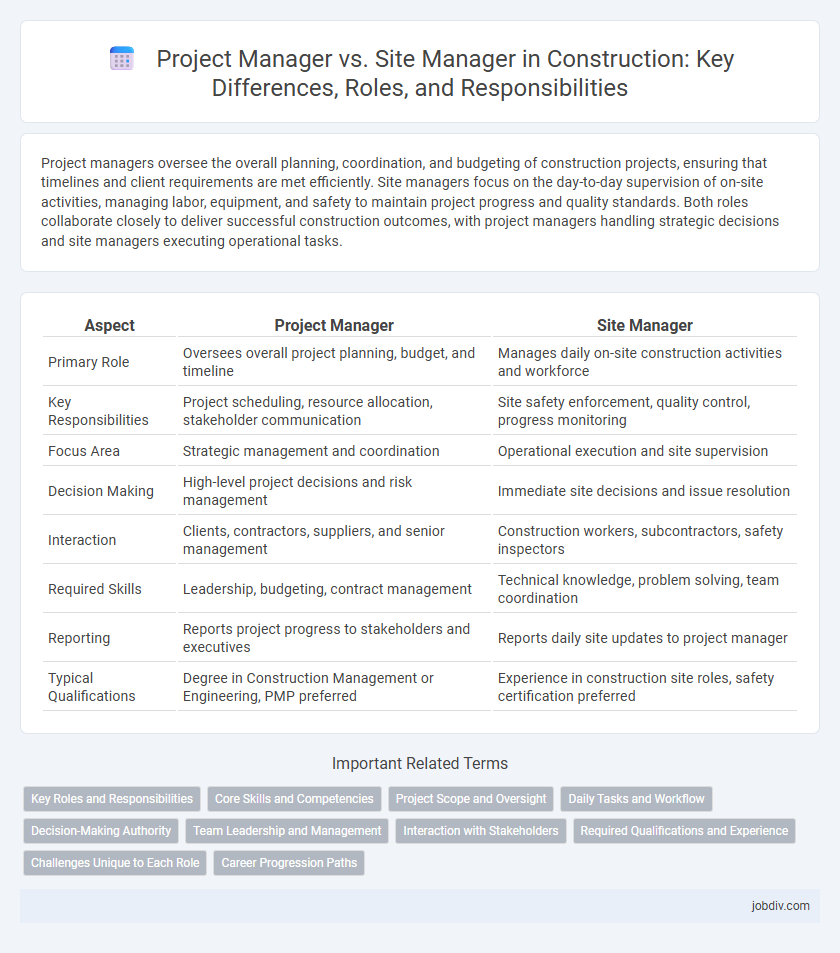Project managers oversee the overall planning, coordination, and budgeting of construction projects, ensuring that timelines and client requirements are met efficiently. Site managers focus on the day-to-day supervision of on-site activities, managing labor, equipment, and safety to maintain project progress and quality standards. Both roles collaborate closely to deliver successful construction outcomes, with project managers handling strategic decisions and site managers executing operational tasks.
Table of Comparison
| Aspect | Project Manager | Site Manager |
|---|---|---|
| Primary Role | Oversees overall project planning, budget, and timeline | Manages daily on-site construction activities and workforce |
| Key Responsibilities | Project scheduling, resource allocation, stakeholder communication | Site safety enforcement, quality control, progress monitoring |
| Focus Area | Strategic management and coordination | Operational execution and site supervision |
| Decision Making | High-level project decisions and risk management | Immediate site decisions and issue resolution |
| Interaction | Clients, contractors, suppliers, and senior management | Construction workers, subcontractors, safety inspectors |
| Required Skills | Leadership, budgeting, contract management | Technical knowledge, problem solving, team coordination |
| Reporting | Reports project progress to stakeholders and executives | Reports daily site updates to project manager |
| Typical Qualifications | Degree in Construction Management or Engineering, PMP preferred | Experience in construction site roles, safety certification preferred |
Key Roles and Responsibilities
Project Managers oversee overall construction project planning, budgeting, and stakeholder coordination to ensure timely and cost-effective delivery. Site Managers focus on on-site supervision, managing daily operations, safety compliance, and team coordination to maintain quality standards. Both roles require strong communication skills but differ in strategic oversight versus hands-on site management.
Core Skills and Competencies
Project Managers in construction excel in strategic planning, budget management, and stakeholder communication, ensuring project objectives align with client expectations and regulatory standards. Site Managers specialize in on-site operations, showcasing expertise in safety oversight, resource allocation, and team leadership to maintain workflow efficiency and compliance. Both roles demand strong problem-solving skills and adaptability, yet Project Managers prioritize project scope control while Site Managers focus on day-to-day execution and site-specific challenges.
Project Scope and Oversight
Project Managers define the overall project scope, ensuring alignment with client objectives and managing budgets, timelines, and resources at a strategic level. Site Managers concentrate on on-site oversight, coordinating daily operations, supervising the workforce, and ensuring compliance with safety and quality standards. Both roles require collaboration to successfully deliver construction projects within agreed parameters.
Daily Tasks and Workflow
A Project Manager oversees the overall construction project, coordinating schedules, budgets, and communication with stakeholders to ensure timely completion. A Site Manager focuses on daily on-site activities, supervising labor, managing resources, and maintaining safety standards to ensure smooth workflow. Both roles require collaboration to align strategic planning with practical execution for efficient project delivery.
Decision-Making Authority
Project Managers hold higher decision-making authority, overseeing project scope, budget, and timelines to ensure alignment with client objectives and contractual obligations. Site Managers make immediate decisions related to on-site operations, safety, and resource allocation to maintain workflow efficiency and compliance with construction plans. The hierarchical structure allows Project Managers to set strategic direction while Site Managers execute tactical decisions on the ground.
Team Leadership and Management
Project Managers in construction oversee overall project execution, coordinating multidisciplinary teams and ensuring alignment with timelines, budgets, and quality standards. Site Managers lead on-site operations, directly supervising construction workers, managing daily activities, and enforcing safety regulations to maintain efficient workflow. Effective team leadership from both roles ensures project success through clear communication, conflict resolution, and resource allocation.
Interaction with Stakeholders
Project Managers coordinate with clients, architects, and engineers to align project goals and ensure budget adherence, while Site Managers focus on direct communication with on-site workers, subcontractors, and suppliers to maintain daily operations and safety standards. Effective interaction between these roles facilitates seamless information flow and timely decision-making across all project stakeholders. This collaboration ultimately optimizes project delivery and mitigates risks throughout construction phases.
Required Qualifications and Experience
Project Managers in construction typically require a bachelor's degree in construction management, civil engineering, or related fields, alongside 5-10 years of experience in project planning, budgeting, and stakeholder communication. Site Managers generally need a diploma or degree in construction or building technology with 3-7 years of hands-on site supervision and safety compliance expertise. Both roles demand strong leadership skills, but Project Managers emphasize strategic oversight while Site Managers focus on on-site operational execution.
Challenges Unique to Each Role
Project Managers in construction face challenges such as coordinating multiple stakeholders, managing budgets, and ensuring project timelines align with client expectations, while Site Managers encounter unique obstacles like overseeing on-site labor safety, handling daily resource allocation, and addressing unexpected site conditions that impact workflow. Project Managers must navigate regulatory compliance and procurement complexities, whereas Site Managers prioritize real-time problem-solving and maintaining communication between field teams and upper management. Both roles require distinct skill sets tailored to strategic planning versus operational execution in construction project delivery.
Career Progression Paths
Project Managers in construction typically advance to roles such as Program Manager or Portfolio Manager, overseeing multiple projects and strategic planning. Site Managers often progress to senior Site Manager or Construction Manager positions, focusing on larger sites and complex operations. Career growth for Project Managers leans toward broader organizational leadership, while Site Managers develop expertise in on-site execution and team management.
Project Manager vs Site Manager Infographic

 jobdiv.com
jobdiv.com